What if we did Gladiator, but with more special effects and less Russell Crowe? That’s a pithy pitch for the sequel to the Oscar-winning Ridley Scott film from 24 years ago. But if Gladiator II is a revival of the big, bold historical epics with which Scott has become synonymous, little of his latest effort will echo in eternity.
For viewers who associate the Rome of the original with Maximus and the Colosseum, Gladiator II covers familiar territory. Set 16 years after the original, it stars Paul Mescal as Lucius, son of Maximus and Lucilla (Connie Nielsen, reprising her role). Like its predecessor, the film’s opening depicts a spectacular battle, but this time it’s an amphibious assault against a Numidian city along the northern coast of Africa rather than a pitched fight in forested Germania. After his wife is killed by the Roman general Marcus Acacius (Pedro Pascal), Lucius is sold to Macrinus (Denzel Washington), a provincial gladiator trainer who promises to help him take his revenge and win his freedom. Thirty minutes in, the audience is headed down a well-trodden path, with nostalgic montages of hands waving through fields of wheat along the way.
Much of what’s new in the movie is expected—and welcome. In his 2000 review of the first Gladiator, Jonah Goldberg predicted, “There was a time when they flooded the arena with water and actually had naval battles (maybe they’ll do that in the sequel).” Scott delivers. In one of Gladiator II’s most exciting scenes, fighters reenact the Battle of Salamis between the Greek and Persian fleets. Lucius takes command of his trireme’s oarsmen—just as his father formed up his own men into a testudo and single columns—only this time, computer-generated sharks circle the waters, ready to snap on any gladiators who fall off the ships.
What’s changed most isn’t the story arc but the market that produced it. While Crowe already had credits like L.A. Confidential under his belt, Gladiator landed him on the A-list, and he never left Rome behind. A quarter century later, his X profile picture is still Maximus yelling, “Are you not entertained?” (The headline of nearly every review of Gladiator II quotes that question.) With a renaissance of interest in the ancient world, movies like Troy (2004), TV shows like Rome (2005), and podcasts like “The History of Rome” followed, leaving legions of young men to spend an inordinate amount of time thinking about the Roman Empire.
Yet Scott’s new film feels primarily like pure entertainment, rather than a cultural touchstone. There are no new memorable lines. Despite overall positive reviews and box office success—$55.5 million domestically and $50.5 million internationally in opening weekend ticket sales alone—it’s not a prestige film set to take in major awards. And while turn-of-the-millennium blockbusters like Gladiator, Titanic, and Braveheart used to win the Oscar for Best Picture, these days—with rare exceptions like Oppenheimer—top prizes go to art-house films rather than mass-market offerings with the potential to become classics.
So no matter how good his performance was, it’s unlikely that Gladiator II will do for Mescal’s career what Gladiator did for Crowe’s. With the growth of online media and streaming, audiences have more choices than ever before, and they’re demanding, and rewarding, content of different kinds and in different ways before moving on to the next big thing. And if Gladiator II is any indication, this trend may mean the slow death of the movie star. Like Crowe, Mescal achieved fame before he entered the Colosseum, with an Academy Award nomination for his role in 2022’s Aftersun. But a well-received turn in a few movies no longer does a star make, and a big break doesn’t hold the public’s imagination for long, especially when that public is as fragmented and siloed as it is today. There’s always something new and entertaining.
Future opportunities for the promising Mescal, 28, will also differ from those Crowe explored 24 years ago. The top 10 highest-grossing films of 2024 are so far all sequels. Gladiator II repeats themes and scenes from the original. It even has its own “I’m Spartacus” moment, although this one feels more like a failed inside joke with the audience than a true expression of feeling from actors channeling the passion of a Kirk Douglas or Tony Curtis. Today’s leading roles retell many of the same stories, refighting the same fights as they did decades ago. And new stars aren’t born in the shadows of the past.
In a changing film industry, viewers have more choices and minor celebrity is easier to achieve. But ascending to the pantheon of lasting movie stardom is more improbable than ever. An actor whose performance and career demonstrates that clearly is in Gladiator II, and he steals the show: Denzel Washington. Though Washington, 69, plays a supporting role, he dominates the story. He’s more comfortable, more charismatic, more convincing, and more powerful than his castmates, and when he’s on screen, you rarely look at anyone else.
Even critics of Washington’s performance acknowledge he’s in a league of his own. In the Wall Street Journal, Kyle Smith points out that Washington’s “American accent … and his modern way of speaking seem at odds with what everyone else is doing.” But why, exactly, is that a problem? Paul Mescal is Irish, and Derek Jacobi, who plays Senator Gracchus, is English. But the Romans they portray weren’t from the British Isles, and there’s no reason they should sound like it. Macrinus’ background is unknown, but he’s definitely not from the capital. If Romans can sound like they’re from London, why can’t foreigners, especially if they’re played by Denzel Washington, talk like they’re from New York (or, per Francis Ford Coppola’s Megalopolis, New Rome)?
The Rome of Gladiator II, like the Hollywood that produced it, struggles to create men and women whose examples and careers are worth following. It’s dirtier and more barbaric. It’s led by not one, but two, ridiculous, over-sexed tyrants, Geta (Joseph Quinn) and Caracalla (Fred Hechinger), both of whom make Joaquin Phoenix’s Commodus look like a statesman by comparison. Marcus Aurelius is a distant memory, and his philosophy is either not remembered at all or perverted. But though there are few heroes, there’s still a spark, an idea that’s true, and that gets the mobs and legions cheering in the end for something other than being entertained to death.
What will keep audiences coming back to movie theaters is new, true ideas, not just spectacles or the occasional strong performance by passing stars. Those get old when they’re merely repackaged from sequel to sequel. A well-told story on an epic scale will find an audience, as the 86-year-old Ridley Scott has demonstrated throughout his long and wonderful career.
If that doesn’t work, though, here’s hoping Gladiator III doesn’t take another 24 years. We may be living through the decline and fall of the movie star, but that’ll take a long time. Meanwhile, the special effects will be spectacular.
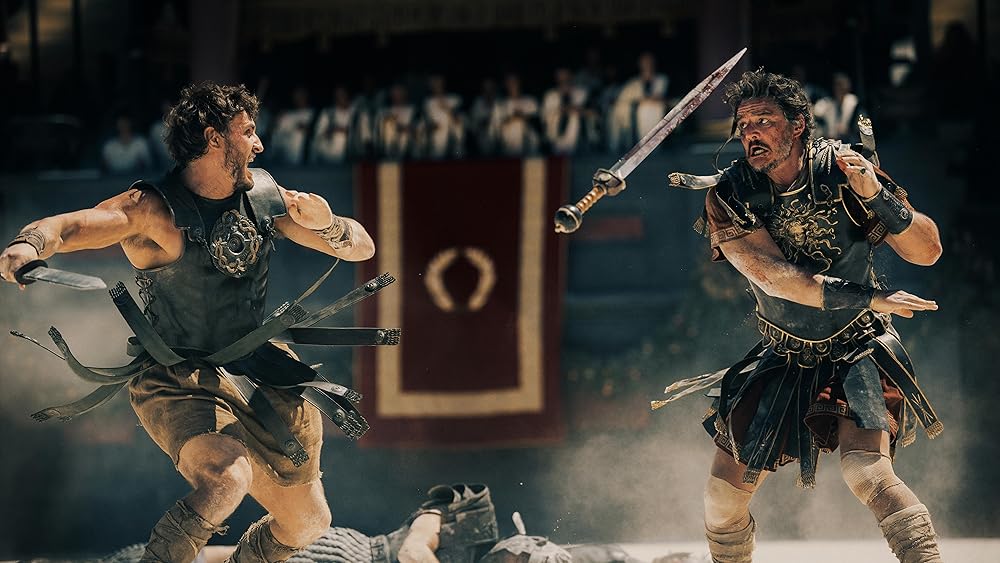
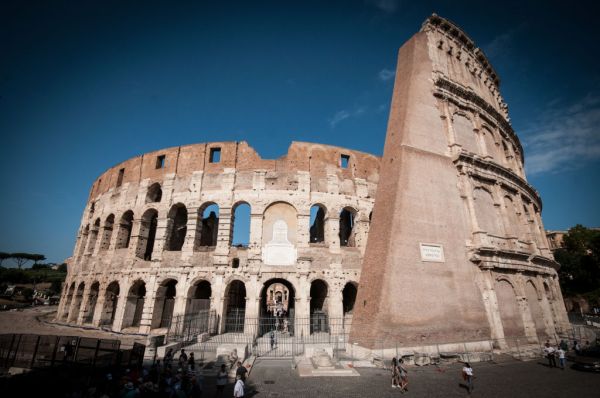
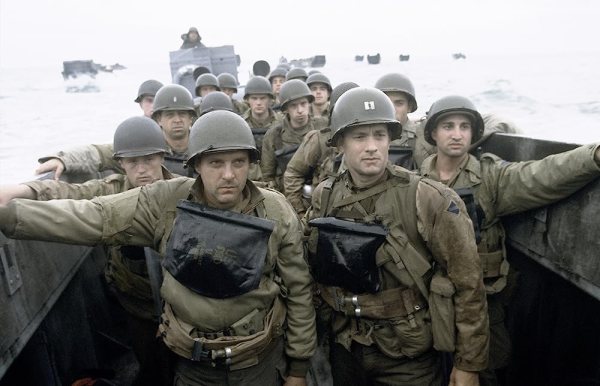
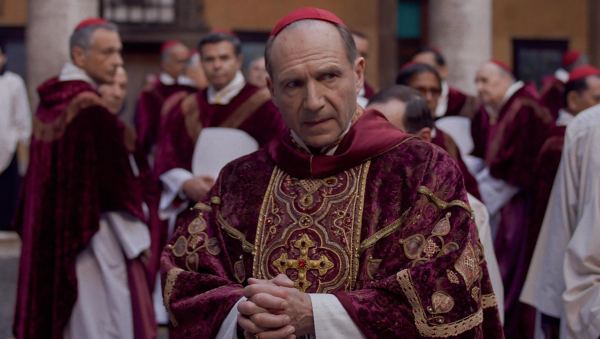

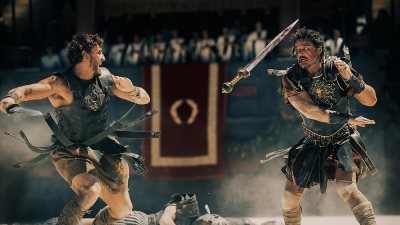
Please note that we at The Dispatch hold ourselves, our work, and our commenters to a higher standard than other places on the internet. We welcome comments that foster genuine debate or discussion—including comments critical of us or our work—but responses that include ad hominem attacks on fellow Dispatch members or are intended to stoke fear and anger may be moderated.
With your membership, you only have the ability to comment on The Morning Dispatch articles. Consider upgrading to join the conversation everywhere.